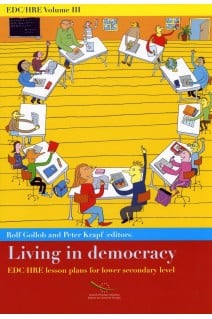



This is a manual for teachers in Education for Democratic Citizenship (EDC) and Human Rights Education (HRE), EDC/HRE textbook editors and curriculum developers. Nine teaching units of approximately four lessons each focus on key concepts of EDC/HRE. The lesson plans give step-by-step instructions and include student handouts and background information for teachers. In this way, the manual is suited for trainees or beginners in the teaching profession and teachers who are receiving in-service teacher training in EDC/HRE. Experienced teachers may draw on the ideas and materials. The complete manual provides a full school year's curriculum for lower secondary classes, but as each unit is also complete in itself, the manual allows great flexibility in use.The objective of EDC/HRE is the active citizen who is willing and able to participate in the democratic community. Therefore EDC/HRE strongly emphasise action and task-based learning. The school community is conceived as a sphere of authentic experience where young people can learn how to participate in democratic decision making and may take responsibility at an early age. Key concepts of EDC/HRE are taught as tools of life-long learning.
Introduction
The conceptual framework of the manual: key concepts
Part 1 - Individual and community
Unit 1: Stereotypes and prejudices. What is identity? How do I perceive others, how do they see me?
Unit 2: Equality. Are you more equal than me?
Unit 3: Diversity and pluralism. How can people live together peacefully?
Unit 4: Conflict. What to do if we disagree?
Part 2 - Taking responsibility
Unit 5: Rights, liberties and responsibilities. What are our rights and how are they protected?
Unit 6: Responsibility. What kind of responsibilities do people have?
Part 3 - Participation
Unit 7: A class newspaper. Understanding media by producing media
Part 4 - Power and authority
Unit 8: Rules and law. What sort of rules does a society need?
Unit 9: Government and politics. How should society be governed?
Télécharger un extrait (1000)

This is a manual for teachers in Education for Democratic Citizenship (EDC) and Human Rights Education (HRE), EDC/HRE textbook editors and curriculum developers. Nine teaching units of approximately four lessons each focus on key concepts of EDC/HRE. The lesson plans give step-by-step instructions and include student handouts and background information for teachers. In this way, the manual is suited for trainees or beginners in the teaching profession and teachers who are receiving in-service teacher training in EDC/HRE. Experienced teachers may draw on the ideas and materials. The complete manual provides a full school year's curriculum for lower secondary classes, but as each unit is also complete in itself, the manual allows great flexibility in use.The objective of EDC/HRE is the active citizen who is willing and able to participate in the democratic community. Therefore EDC/HRE strongly emphasise action and task-based learning. The school community is conceived as a sphere of authentic experience where young people can learn how to participate in democratic decision making and may take responsibility at an early age. Key concepts of EDC/HRE are taught as tools of life-long learning.
Attention, en vertu de nos conditions générales de vente, l'achat des PDF/epub est réservé aux particuliers.
